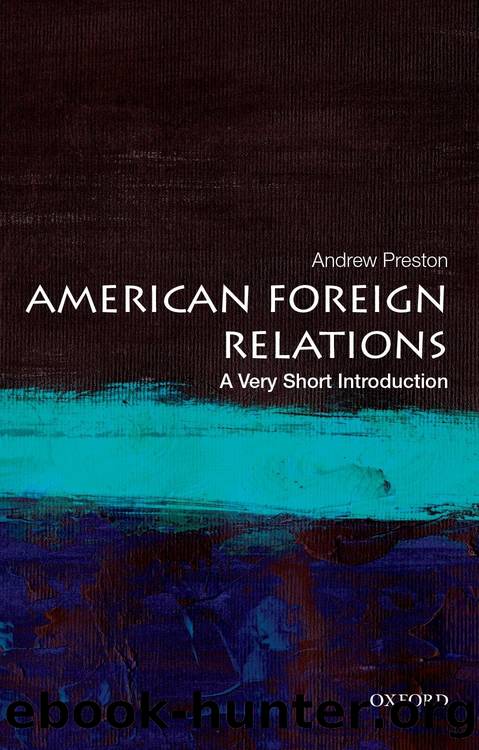American Foreign Relations by Andrew Preston

Author:Andrew Preston [Preston, Andrew]
Language: eng
Format: epub
ISBN: 9780190946029
Publisher: Oxford University Press
Published: 2019-01-28T00:00:00+00:00
America in the world
Despite rejecting the internationalist marriage Woodrow Wilson had arranged between the United States and the rest of the world, America was still the strongest state in the international system, and it was still as thoroughly enmeshed in globalization as ever. Americans couldnât avoid the world any more than the rest of the world could avoid America. Even if the United States didnât join the League of Nations (forty-two other countries did), it was still a major political, military, and economic influence on world affairs. Wilsonianism might have been a false start, but American internationalism wasnât yet dead.
We thus need to rethink two pervasive myths about American foreign policy between the world wars. The first is isolationism. While itâs true that the United States didnât help plan much of the formal international architecture drawn up after the Great War, it did join other states in the collaborative maintenance of postwar order. In 1921â22, for example, Washington hosted a multinational conference on naval disarmament in the Pacific; three treaties, signed by the United States, Japan, Britain, France, and several other countries, reduced great-power tensions along the Pacific Rim. Americans were active in European politics as well. By revising the payment schedule of reparations from World War I, the 1924 Dawes Plan and the 1929 Young Plan (named, respectively, for the American banker Charles Dawes and the American businessman Owen Young) refinanced Europeâs debts and alleviated tensions that could have led to another outbreak of war. And in 1928, Secretary of State Frank Kellogg signed the Pact of Paris, a formal treaty by which states agreed to the ârenunciation of war as an instrument of national policyââin essence, the abolition of war. Itâs true that some of these initiatives suffered from a lack of enforcementâthe wholly idealistic and unworkable Pact of Paris is a particularly egregious example. And itâs true that many of them lacked crucial backing from Washingtonâthe refinancing of European debt was done mostly with loans from US banks, not the Treasury, which made them more unstable. But they were hardly the actions of a genuinely âisolationistâ power.
The second myth, related to the first, is the supposed trend of deglobalization. Economic historians have done the most to chart the ebb and flow of historical globalization, and their work is enlightening. But it can also be misleading, for if we only measure globalization in terms of economic measurements we miss a great deal. Itâs certainly true that World War I had an adverse impact on overseas trade, though some sectors of the economy saw a boost of exports to Europe. On top of that, Congress passed a series of bills, culminating in the 1924 National Origins Act, that restricted the legal flow of immigrants into the United States. The flow of goods and peopleâtwo of the benchmarks for measuring globalizationâdidnât recover for another half-century. But as weâve seen, the US government was hardly inactive in world affairs in the 1920s. Moreover, private interests and ordinary citizens were ahead of their government in forging links with the rest of the world.
Download
This site does not store any files on its server. We only index and link to content provided by other sites. Please contact the content providers to delete copyright contents if any and email us, we'll remove relevant links or contents immediately.
Chaco's Northern Prodigies : Salmon, Aztec, and the Ascendancy of the Middle San Juan Region after AD 1100 by Paul F. Reed(367)
Digital International Relations by Unknown(366)
Law Enforcement Interpersonal Communication and Conflict Management by Brian Douglas Fitch(359)
The Enduring Color Line in U.S. Athletics by Krystal Beamon Chris M. Messer(340)
Skilled interpersonal communication: Research, theory and practice, Fifth edition by Owen Hargie(339)
Critical Perspectives on Human Security : Rethinking Emancipation and Power in International Relations by David Chandler; Nik Hynek(336)
EPSO CAST Political affairs EU policies: How to succeed in the selection procedure by Franco Reverte José María(313)
Evidence-Based Policy Making in Labor Economics by Hamermesh Daniel S.;Nottmeyer Olga K.;Nottmeyer Olga;King Sarah;King Sarah;King Sarah;(309)
Writing Public Policy - A Practical Guide to Communicating in the Policy Making Process by Catherine F. Smith(292)
Criminological Theory in Context by John Martyn Chamberlain(286)
Rothschild and Early Jewish Colonization in Palestine (Geographical Perspectives on the Human Past) by Ran Aaronsohn(280)
Tibeton Yoga Its Secret Doc by Evans-Wentz(279)
Threshold Concepts in Women's and Gender Studies by Christie Launius Holly Hassel(273)
Social Problems, Social Issues, Social Science by James Wright(272)
Positive Psychology and Spirituality in Counselling and Psychotherapy (Conflict, Ethics, and Spirituality, 12) by unknow(269)
Cognitive Development in Infancy and Childhood (Elements in Child Development) by Mary Gauvain(268)
Play in child development and psychotherapy: toward empirically supported practice by Sandra W. Russ(261)
Latin American Politics and Society by Gerardo L. Munck & Juan Pablo Luna(238)
What Makes a Social Crisis?: The Societalization of Social Problems by Jeffrey C. Alexander(227)
